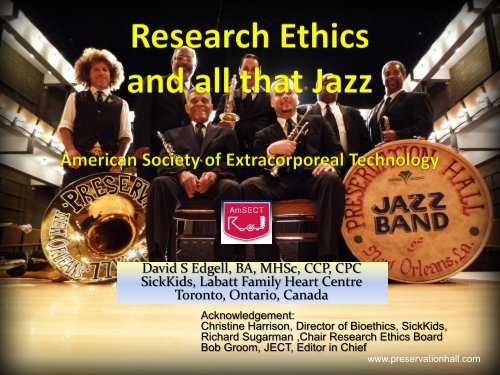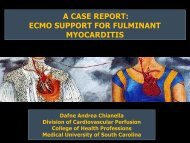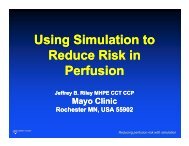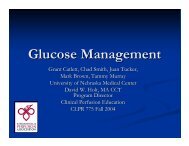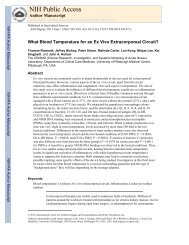PowerPoint Presentation (PDF) - Perfusion.com
PowerPoint Presentation (PDF) - Perfusion.com
PowerPoint Presentation (PDF) - Perfusion.com
Create successful ePaper yourself
Turn your PDF publications into a flip-book with our unique Google optimized e-Paper software.
David S Edgell, BA, MHSc, CCP, CPC<br />
SickKids, Labatt Family Heart Centre<br />
Toronto, Ontario, Canada<br />
Acknowledgement:<br />
Christine Harrison, Director of Bioethics, SickKids,<br />
Richard Sugarman ,Chair Research Ethics Board<br />
Bob Groom, JECT, Editor in Chief<br />
www.preservationhall.<strong>com</strong>
Opening Thought<br />
“An experiment is ethical or not at its<br />
If inception; a study is it unethical does not to be<strong>com</strong>e start with, ethical it<br />
does post not hoc be<strong>com</strong>e – ends do ethical not justify because the it<br />
produces means. There useful is results. no ethical distinction<br />
between ends and means.”<br />
Ethics and clinical research<br />
Henry Beecher, 1966, NEJM Vol.274,24,367 -372
Objectives<br />
• Improve understanding of ethical research.<br />
• Describe the “Gelsinger”case and<br />
publications that illustrate the impact of<br />
unethical research.<br />
• Review Research Ethics references in<br />
AmSECT documents and benchmark<br />
journals.<br />
• Show that written standards are not enough.<br />
• Suggest improving Research Ethics<br />
education for <strong>Perfusion</strong>ists.
Modern era in research ethics<br />
• 1931 directive German Reich Minister of the<br />
Interior<br />
• Forbids “innovative therapy” unless the<br />
“subject or his legal representative has<br />
unambiguously consented to the<br />
procedure in the light of relevant<br />
information provided in advance”
Nuremberg Code – 1947<br />
•“Doctors’ Trial”, post<br />
W.W.II war crimes<br />
tribunal<br />
•Response to<br />
research atrocities<br />
•Deliberate<br />
infection with<br />
malaria, smallpox,<br />
cholera<br />
•Sexual sterilization<br />
experiments<br />
•Cold temperature<br />
experiments<br />
www.nuernberg.de/.../doctors_trial.html Downloaded March 2011
HHS Policy for Protection of Human Research Subjects<br />
Code of Federal Regulations<br />
DEPARTMENT OF HEALTH AND HUMAN SERVICES PART 46 Revised January 15, 2009<br />
• In order to approve research covered by this policy the<br />
IRB shall determine that all of the following<br />
requirements are satisfied:<br />
• Risks to subjects are minimized<br />
• Risks to subjects are reasonable in relation to<br />
anticipated benefits, if any, to subjects, and the<br />
importance of the knowledge that may reasonably be<br />
expected to result.<br />
• Selection of subjects is equitable.<br />
• Informed consent will be sought from each prospective<br />
subject or the subject's legally authorized representative,<br />
http://www.hhs.gov/ohrp/humansubjects/guidance/45cfr46.htm#46.111
A good place to start!<br />
For help writing a<br />
research protocol<br />
http:www.cc.nih.gov/cc/proto<br />
mechanics/index.html<br />
For studies with <strong>com</strong>plex<br />
ethics or regulatory<br />
considerations contact<br />
your IRB Chair<br />
OHSR (301-402-3444)<br />
The clinical Center’s<br />
Department of Bioethics<br />
(301– 496-2429)<br />
This booklet is available from NIH<br />
50 copies will be at the Ethics Committee table at the<br />
AmSECT Committee Fair this Saturday
What does our professional society<br />
say about research?<br />
• Code of Ethics<br />
• Maintain and promote high standards for perfusion<br />
practice which may include education, research and<br />
scientific presentations and/or publications.<br />
• Protect the rights of patients and animals involved in<br />
research and conduct research in accordance with<br />
accepted ethical and reporting standards.<br />
• AmSECT Role Document<br />
• Quality Improvement framework<br />
• … clinical evaluations and documented clinical and<br />
scientific data.<br />
• … not <strong>com</strong>promised by gratuities, gifts,<br />
entertainment, consulting engagements, employment<br />
status, or any other material or personal gain.<br />
www.amsect.org
<strong>Perfusion</strong> projects lend themselves<br />
to Quality Improvement initiatives.<br />
• QI is designed to bring about immediate<br />
improvements in healthcare delivery.<br />
• QI is designed to have its findings applicable<br />
only to the local institution.<br />
• QI is designed to sustain the improvements.<br />
• QI does not require rigid, fixed protocols;<br />
• Within QI activities it is acceptable to adapt the<br />
project over time.<br />
• May be publishable in QI journals
When does it be<strong>com</strong>e research?<br />
•Research is defined as “a systematic<br />
investigation, including development,<br />
testing, and evaluation, designed to<br />
develop or contribute to generalisable<br />
knowledge.”
When Do I Require Ethics Approval?<br />
•If you plan to conduct research that<br />
involves human subjects, you are<br />
required to seek, and receive, ethics<br />
approval from the appropriate research<br />
ethics board/<strong>com</strong>mittee before<br />
proceeding with your study.<br />
http://<strong>com</strong>cul.ucalgary.ca/approval
Where does the scientific <strong>com</strong>munity stand with respect<br />
to adherence to the concepts of research ethics?<br />
ORI - US dept of Health and Human Services<br />
Benos DJ et al, Advan Physiol Educ 29:59-74,2004
Scientific Misconduct takes various forms.<br />
Benos DJ et al, Advan Physiol Educ 29:59-74,2004
A prime example in the current literature.<br />
May 2011 • Volume 112 • Number 5 editorial<br />
www.anesthesia-analgesia.org<br />
• Notices of Retraction<br />
• In 2009, Dr. Joachim Boldt published a manuscript in<br />
Anesthesia & Analgesia - Comparing albumin and<br />
hydroxyethyl starch priming cardiopulmonary bypass.<br />
• “review determined that there was no IRB approval for the study. The article<br />
was retracted in December 2010.”<br />
• “Research without IRB approval is a violation of human rights. As described in<br />
Guide for Authors,26 and a recent editorial,27 Anesthesia & Analgesia requires<br />
IRB approval for all human research. There are no exceptions.”<br />
• “The 22 manuscripts published by Dr. Boldt for which IRB approval has not<br />
been confirmed by LÄK-RLP are hereby retracted for unethical conduct of<br />
research.”<br />
• “103 additional manuscripts included Dr. Boldt as a coauthor”<br />
http://www.anesthesia-analgesia.org/ Downloaded April 10, 2011
A significant proportion of journals still do not<br />
demand statements of adherence to standards.<br />
A <strong>com</strong>parison of journal instructions regarding institutional review board approval and conflict<br />
of interest disclosure between 1995 and 2005, Rowan- Legg, J Med Ethics :35 74-78 ; 2009
What about our benchmark journals?<br />
• Human investigation<br />
• “Include the date of institutional review board or<br />
human research <strong>com</strong>mittee approval, or the ethical<br />
guidelines that were followed by the investigators<br />
in the materials and methods section of the<br />
manuscript.”<br />
http://www.ject.org/sections/authorinstructions/index.html downloaded March 2011
What about our benchmark journals?<br />
“When reporting experiments on<br />
human subjects, indicate<br />
whether the procedures followed<br />
were in accordance with the<br />
ethical standards of the<br />
responsible <strong>com</strong>mittee on<br />
human experimentation<br />
(institutional or regional) or with<br />
the Declaration of Helsinki 1975,<br />
revised Hong Kong 1989.<br />
http://www.uk.sagepub.<strong>com</strong>/repository/binaries/pdf/PRF_Manuscript_Guidelines.pdf#6.2<br />
Downloaded March 2011
What is the <strong>Perfusion</strong>ist’s role.<br />
Time Magazine<br />
April 2002<br />
Although we may not have initiated the research, the projects of<br />
others have an impact on us.<br />
The public expects that we are knowledgeable and attentive with<br />
respect to their rights.
Case from the literature<br />
“Gene Therapy Under Scrutiny<br />
Experts Suggest Tougher Controls”<br />
18-year-old Jessie Gelsinger, volunteered to be part of a study<br />
conducted at the University of Pennsylvania.<br />
He had a rare metabolic disease, ornithine transcarbamylase<br />
deficiency, which prevents the body from properly<br />
processing nitrogen.<br />
The disease is usually fatal at birth, but Gelsinger had not<br />
inherited the disease; in his case it was the result of a<br />
genetic mutation and as such was not as severe - some of<br />
his cells were normal which enabled him to survive on a<br />
restricted diet and special medications.<br />
http://www.cbsnews.<strong>com</strong>/stories/1999/12/08/broadcasts/main57783.shtml
A failure to adhere to research ethics.<br />
• Gelsinger was injected with an adenoviral vector carrying a<br />
corrected gene to test the safety of the procedure.<br />
• An (FDA) investigation concluded that the scientists<br />
involved in the trial, broke several rules of conduct:<br />
• Inclusion of Gelsinger as a substitute for another<br />
volunteer who dropped out, despite having high<br />
ammonia levels that should have led to his exclusion<br />
from the trial<br />
• Failure by the university to report that two patients had<br />
experienced serious side effects from the gene therapy<br />
• Failure to mention the deaths of monkeys given a similar<br />
treatment in the informed consent documentation.
What has this got to do with <strong>Perfusion</strong>?<br />
Jesse’s last hours according to his father<br />
• 10:30<br />
• 3:00<br />
• 5:00<br />
• 12:00<br />
• 8:00 AM<br />
Respiratory failure on the ventilator resulted in<br />
ECMO being requested.<br />
“It seemed to take forever for them even to get<br />
an artificial lung ready.”<br />
“Dr. S came to see me and said the ECMO had a<br />
major leak and Dr. R had his finger on the leak.<br />
I quipped that I was a plumber , maybe that’s<br />
what they needed.”<br />
“More than 10 units of blood used in hooking<br />
him up. When we finally got to see Jesse he was<br />
bloated beyond all recognition. His eyes were<br />
swelled shut and the wax was being extruded<br />
out of his ears.”<br />
Next day - Jesse died
Impact<br />
All medical research<br />
has been affected.<br />
1981 - 1999<br />
• The University of Pennsylvania paid the parents an<br />
undisclosed amount in settlement.<br />
• Both the PI and the University are reported to have<br />
had financial stakes in the research.<br />
• The Gelsinger case was a severe setback for scientists<br />
working in the field.
Heart Ache<br />
• “We are just research subjects in an enormous<br />
marketplace, manipulated into believing the hype and<br />
vision of the very ambitious. That ambition is blinding<br />
not only the innocent but also those so tied up in the<br />
endeavors of modern science that they have no hope of<br />
really seeing the right path to the truth.”<br />
• Paul Gelsinger on the death of his son<br />
Uninformed consent: The Case of Jesse Gelsinger by Paul<br />
Gelsinger in Law and Ethics in Biomedical Research, edited<br />
by Lemmens and Waring, U of T Press, 2006
Conclusion<br />
•Historically <strong>Perfusion</strong>ists have focused<br />
their attention on clinical practice but<br />
they have used research methods to<br />
advance their knowledge base.<br />
•Research ethics and its processes are<br />
not meant to hinder research but to<br />
ensure that good research is<br />
undertaken.
Conclusion<br />
•Ethical research practices are essential<br />
for <strong>Perfusion</strong>ists as we continue to<br />
assume our potential as respected<br />
health professionals working as valued<br />
members of an interdisciplinary team.<br />
•Research Ethics education should be a<br />
strategic objective of AmSECT.


